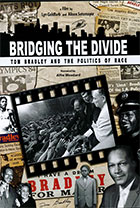
Bridging the Divide: Tom Bradley and the Politics of Race 2015
Distributed by mayortombradley.com
Produced by Lyn Goldfarb and Allison Sotomayor
Directed by Lyn Goldfarb and Allison Sotomayor
DVD, color, 57 min.
High School - General Adult
African Americans, African American History, Race Relations, Political Science, History
Date Entered: 03/28/2017
Reviewed by Jenifer Becker, Washington State University, VancouverBridging the Divide plays tribute to the life and political accomplishments of Los Angeles Mayor Tom Bradley, the first African American Mayor of a predominantly white major United States city. Originally from Texas, as a child Bradley’s family took part in the migration that led many African American families to Northern and Western cities in the early and mid-20th century. His life in Los Angeles was marked with first’s and few’s, from his time as one of only 55 Black students at University of California, Los Angeles to his five term mayorship. Told from the perspectives of historians and colleagues and with the use of historical footage, this film serves to honor Bradley’s life and political legacy. Through successful cross cultural coalition building, Bradley, as an aid asserts in the film, laid the foundation for the success President Barack Obama saw in the 2008 election.
Beyond a celebration of the accomplishments of Mayor Bradley, the film delves into the history of race relations in Los Angeles. Los Angeles’ segregated housing becomes a focus as Bradley attempts to create a life for his family and as his predecessor refuses to establish an anti-poverty program to keep the system in place. Following Bradley’s 21 years as a police officer and his political career, the underlying story of the film frequently becomes the racist history of the Los Angeles Police Department, beginning with Chief of Police William Parker, described as “Hoover-ish,” and ending with the brutal beating of Rodney King and subsequent civil unrest.
This documentary will be a fine accompaniment to a high school lesson or college course on 20th century U.S. politics, Los Angeles history, or African American figures and accomplishments. The film may also be suitable for environmental racism or justice courses. It tends to be a celebration of Bradley, the cross cultural alliances he built, and a booming period for Los Angeles. If it is being viewed for critical analysis or academic purposes, it may be best to pair it with readings about Bradley and this period of L.A. history. It would make a great addition to any public or academic library.